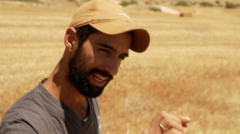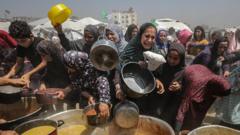The confrontation highlights the deep-seated tensions between Israeli settlers and Palestinians, alongside differing perspectives on land rights and governance.
Tension in the West Bank: Encounter with a Sanctioned Israeli Settler

Tension in the West Bank: Encounter with a Sanctioned Israeli Settler
A BBC team faces a controversial settler during a documentary shoot on the West Bank.
Dust billowed on the track as a white jeep approached, and the tension among the BBC team grew palpable. The driver, identified by local activist Gil Alexander as Moshe Sharvit, is a settler under sanction from Britain and the EU due to violent actions against Palestinian communities. Over the past year, the BBC has been documenting Alexander’s efforts to protect Palestinian shepherds from settlers' intimidation in the Jordan Valley, an area marked by decades of conflict.
Sharvit, accused of using physical aggression and threats to displace Palestinians, has a cloud of controversy surrounding him. Ayesha Shtayyeh, a Palestinian grandmother, has publicly claimed that Sharvit forced her from her home, brandishing a gun during the altercation. Despite the serious allegations against Sharvit, he offered no comment to the BBC regarding Shtayyeh’s claims.
As the BBC crew prepared to film, Sharvit interrupted with hostile remarks aimed at Alexander, labeling him a "dangerous guy." Upon learning of the BBC’s identity, he launched into a tirade against perceived biases and called for police intervention while filming the journalists. This charge of bias from Sharvit embodies a broader narrative in which some Israeli officials, including far-right ministers, uphold the settler's divine right to the land—an interpretation rejected by many outside their circle.
The ideological divide is stark. While Sharvit advocates for complete Jewish settlement in the West Bank, Alexander supports coexistence and believes that Israel's borders should reflect pre-1967 war lines. In a world often polarized by ideological narratives, both men symbolize competing visions for Israel's future. For Alexander, the unchecked expansion of settlements represents a betrayal of Israel’s humanitarian values, while Sharvit portrays the settlers as defenders of Jewish land.
Tensions escalated as Sharvit, who has a history of confrontation with Alexander, claimed he was threatened forcefully during a previous encounter. Alexander, facing legal implications from that previous incident, maintains his actions were in self-defense. Meanwhile, Sharvit himself is under a restraining order protecting a Palestinian family from his alleged intimidation.
As the BBC crew continued their coverage, an unexpected turn occurred—Sharvit agreed to an interview, where he rejected claims of wrongdoing and instead cast Palestinians as aggressors. His statements reflected a defiance rooted in a belief of divine entitlement to land, claiming that conflict would only intensify if Palestinians continued resisting.
Despite these polarizing ideologies, both sides represent larger narratives about security, settlement, and identity in a fraught region. Violence against Palestinians by settlers appears to be escalating, with reports indicating that settler-related incidents have surged since Hamas's attack on Israel in October 2023. Human rights organizations stress that legal consequences for settler violence are alarmingly rare.
As the encounter wrapped and tensions subsided momentarily, it became clear that the conflict stretches far beyond any singular encounter. It embodies a lifetime of division, shaping the lives of those whose homes lie on disputed land. Amidst the complex backdrop of Palestinian-Israeli relations, each voice adds to the ongoing debate over justice, occupation, and the prospect for peace, while individuals like Alexander and Sharvit remain ensnared in the historical narratives that define Israel today.
Sharvit, accused of using physical aggression and threats to displace Palestinians, has a cloud of controversy surrounding him. Ayesha Shtayyeh, a Palestinian grandmother, has publicly claimed that Sharvit forced her from her home, brandishing a gun during the altercation. Despite the serious allegations against Sharvit, he offered no comment to the BBC regarding Shtayyeh’s claims.
As the BBC crew prepared to film, Sharvit interrupted with hostile remarks aimed at Alexander, labeling him a "dangerous guy." Upon learning of the BBC’s identity, he launched into a tirade against perceived biases and called for police intervention while filming the journalists. This charge of bias from Sharvit embodies a broader narrative in which some Israeli officials, including far-right ministers, uphold the settler's divine right to the land—an interpretation rejected by many outside their circle.
The ideological divide is stark. While Sharvit advocates for complete Jewish settlement in the West Bank, Alexander supports coexistence and believes that Israel's borders should reflect pre-1967 war lines. In a world often polarized by ideological narratives, both men symbolize competing visions for Israel's future. For Alexander, the unchecked expansion of settlements represents a betrayal of Israel’s humanitarian values, while Sharvit portrays the settlers as defenders of Jewish land.
Tensions escalated as Sharvit, who has a history of confrontation with Alexander, claimed he was threatened forcefully during a previous encounter. Alexander, facing legal implications from that previous incident, maintains his actions were in self-defense. Meanwhile, Sharvit himself is under a restraining order protecting a Palestinian family from his alleged intimidation.
As the BBC crew continued their coverage, an unexpected turn occurred—Sharvit agreed to an interview, where he rejected claims of wrongdoing and instead cast Palestinians as aggressors. His statements reflected a defiance rooted in a belief of divine entitlement to land, claiming that conflict would only intensify if Palestinians continued resisting.
Despite these polarizing ideologies, both sides represent larger narratives about security, settlement, and identity in a fraught region. Violence against Palestinians by settlers appears to be escalating, with reports indicating that settler-related incidents have surged since Hamas's attack on Israel in October 2023. Human rights organizations stress that legal consequences for settler violence are alarmingly rare.
As the encounter wrapped and tensions subsided momentarily, it became clear that the conflict stretches far beyond any singular encounter. It embodies a lifetime of division, shaping the lives of those whose homes lie on disputed land. Amidst the complex backdrop of Palestinian-Israeli relations, each voice adds to the ongoing debate over justice, occupation, and the prospect for peace, while individuals like Alexander and Sharvit remain ensnared in the historical narratives that define Israel today.






















